Tourist Travel Guide to Ban Gioc Waterfall in Cao Bang Vietnam
Ban Gioc Waterfall is one of the most impressive Vietnam landscape. It is located in Northeastern of Vietnam, near border of Vietnam and China. Ban Gioc Waterfall boasts an impressive natural sight with multiple level and green jade water flowing down the huge lake below.
Ban Gioc still keep its beauty intact thanks to the low number of tourists coming here so Ban Gioc is still considered an ‘off-the-beaten-track’ in north Vietnam. This waterfall is the perfect place for those who love to be closer with nature without being cornered by crowds of tourists.
What is the Best Things to do in Ban Gioc Waterfall and Cao Bang?
1. Admire the most beautiful waterfall in Vietnam
The cave is located about 360 kilometers from Hanoi, nested in a grandiose setting of rock and primitive forest. You know it’s Ban Gioc when you see it – the fall is so huge and more than two level of rock setting, white mist blowing up, a back drop of green mountains and a huge blue mirror lake at the bottom. There’s no mistaking Ban Gioc with any other place in Vietnam, the fall is singular.
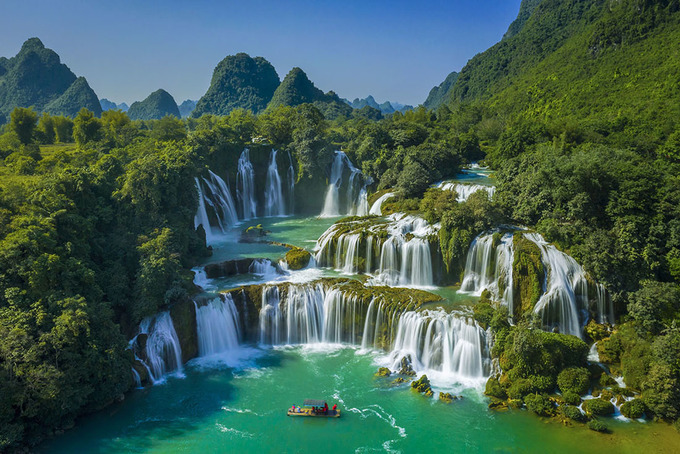
Ban Gioc is about 30m high and 300m wide, making it the widest (not the highest) waterfall in Vietnam. The fall is half on Vietnam land and half on China land as two countries are divided by Quay Son River. Tourists can get close to the cascade by riding on bamboo rafts. Even from afar, you can hear the sounds of the waterfall when the water drops, the water mist also can be seen from a distance, painting the scene even with more poetry.
The waterfall’s cliffs and the rocks on the riverbed are both covered in green moss, contrasting nicely with the sparkling white water of the fall.
In the past, due to its special location in the border line between Vietnam and China, foreigners who wish to visit Ban Gioc must achieve a permission from local administration. In recent years, you don’t have to do that anymore. Tourists just have to show up at the spot and pay a fee of 45.0000VND per person to see the fall.
If you hire a raft, expect to pay about 50,000VND more for a 10-minute ride to get close to the cascade. Do expect to get wet go you might to prepare precaution for your cameras.
2. Trek up to higher levels of the falls:
When you cross over the wooden bridge under the falls, find a path that leads to the upper levels of the fall. When you get up there after a strenuous climb, you will be rewarded with a magical viewpoint down the fall which not everyone is able to have.
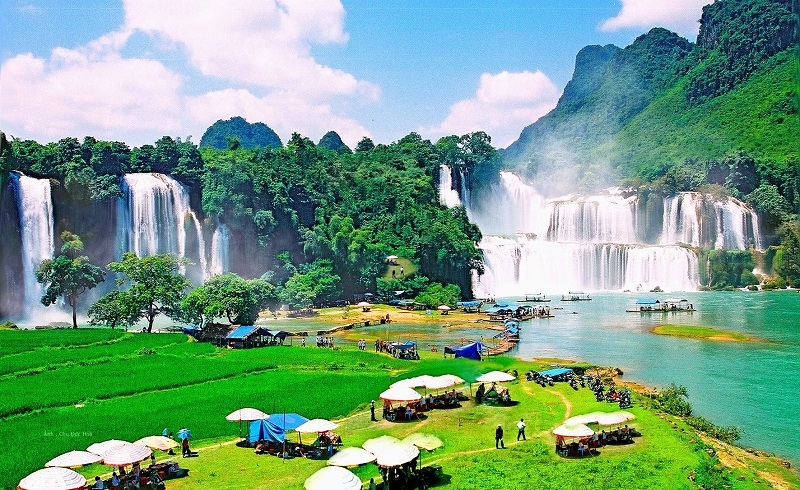
However we do not recommend this activity for those who are not fit enough and without proper footwear because the path is every slippery with huge rocks and thick forest.
3. Enjoy countryside’s peaceful landscape and atmosphere
As you go along Quay Son River before reaching Ban Gioc waterfall, unfold before your eyes is the landscape of a rural region in northeastern Vietnam. The gentle landscape of the valley, dotted with limestone hills evokes a warm feeling in the heart of tourists like many other sceneries in North Vietnam.
Here and there are the rice fields and if you come during harvest season, you can see the delicious golden color of them promising a warmer winter for a people here. On the river, you can see the water wheel which is a common farming technique that still remain in this region. This device takes the water on the river and carries to the level of the fields and channels the water to irrigate the crops. It’s a peaceful and humbling sight to see.
4. Explore Nguom Ngao Cave:
The cave is located in Gun village, Dam Thuy Commune, Trung Khanh District, just 3 kilometers from Ban Gioc Waterfall. It’s recommended that you should take a visit to this cave after admire the wonderful view of Ban Gioc. Like any karst cave in north Vietnam, Nguom Ngao was formed by wind and water for during thousands of time and still forming to this day.
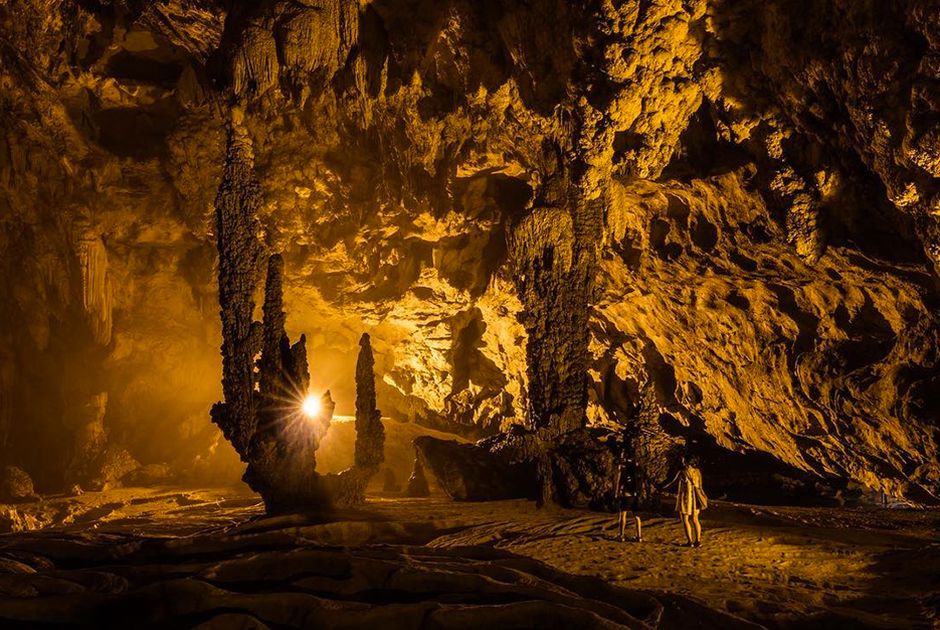
Discovered in 1921 by local people, the cave was opened for tourism purpose since 1996. In no way Nguom Ngao is a small cave – it’s length reaches to 2144m with three entrances (Nguom Ngao, Nguom Lom and Nguom Ban Ton). However, only 900m of the total length was exploited by the local administration. The 900m visible to tourists have a grandiose interior like that of a luxury palace with bright light and crystals. The ceilings and the columns are magnificent with unique formations. There is a beautiful formation which looks like a lotus bud with a really smooth surface.
The legend related to this cave is that the cave was home to many tigers, so it once had the name ‘Tiger tomb’ latter known as Nguom Ngao.
5. Boat Ride in Thang Hen Mountain Lake:
Thang Hen Lake is a freshwater lake in Quoc Toan commune, Tra Linh District, Cao Bang, located on a height of 1000m above the sea. This lake is about 70 kilometers from Ban Gioc waterfall and only 25 kilometers from Cao Bang town.
In Dzay language, the name of the lake means ‘bee’s abdomen’ because that’s what the lake looks like from up high. Only expands to a 100-300m in width, the lake is a quite a pretty place to rest and enjoy nature’s beauty.
The surrounding landscape is blessed with green jade water, green towering limestone mountains, wide flower fields and a peaceful valley. An ecotourism area was built around this lake since 2002 and provide services to attract tourists. You can enjoy boating on the lake and you can also visit a small cave at the base of a mountain known as Thang Hen cave. Camping is also permitted here if you plan to enjoy camping by the lake, remember to bring the tent.
6. Take in the marvelous sight of Phong Nam valley in harvest season:
From Ban Gioc, drive up north for about 24 kilometers, you will reach Ngoc Con commune which belongs to Trung Khanh District, Cao Bang Vietnam. The road to Ngoc Con is not easy for poor road condition and steepness.
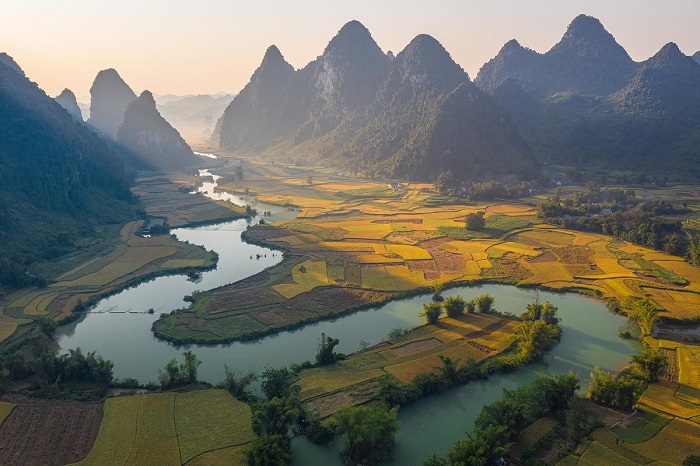
From Ngoc Con, Phong Nam is about 15 kilometers away with better road. The scenery en route is just so beautiful, especially in the afternoon. But the sunset at Phong Nam will be the greatest reward to all of your effort to get there.
The sky will turn purple and sun hide behind the limestone mountains after shredding the last sun rays on the golden rice fields down the valley. If you love Bac Son field in Lang Son, it’s easy fall in love with Phong Nam. But Phong Nam has something gentler than Bac Son with a green river winding across, more primitive with more trees, vaster and with the depth of mountain layers in the backdrop. To reach the viewpoint down Phong Nam, you’ll have to trek to a higher place so prepare in advance to come up on time for the sunset.
7. Visit ethnic handicraft villages in Quang Uyen District:
There are two handicraft villages in Quang Uyen (42 kilometers from Cao Bang town) you can visit for a better insight of daily life of ethnic people in Cao Bang: Phia Thap village in Quoc Dan commune of Nung people and Pac Rang village in Phuc Sen commune.
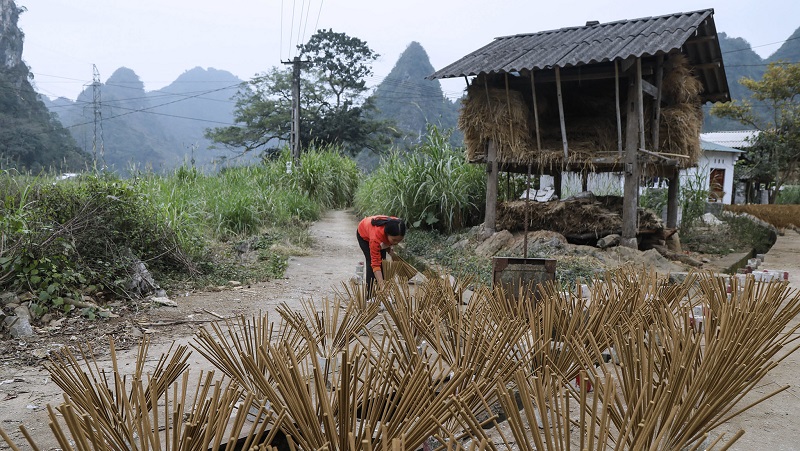
Phia Thap village is an incense making village and home to a Nung community here. Every year, when Lunar New Year is close, the village is bustling in preparation to make the largest number of incense. The incense here are made of organic ingredients with a special fragrance – strong and quite spicy. Visiting the village you will see the whole process of incense making.
Pac Rang is a unique place to visit in Cao Bang. Pac Rang villagers practice traditional forging for generations. This village is home to 51 households of Nung An ethnic minority group. The houses of the people here are stilt houses and the people here make their own clothes. This is a wonderful site for cultural explorers.
8. Learn more about Vietnamese history at Pac Bo Historical Site:
Known with the stories of Ho Chi Minh and the early days of revolution in Vietnam against the French colonialism, one thing of Pac Bo that is underrated is the beautiful landscapes here. Located 132km from Ban Gioc Waterfall, Pac Bo lies close to Chinese territory. The land has not changed much since 1941 when Ho Chi Minh walk across the border from China after 31 years living aboard.
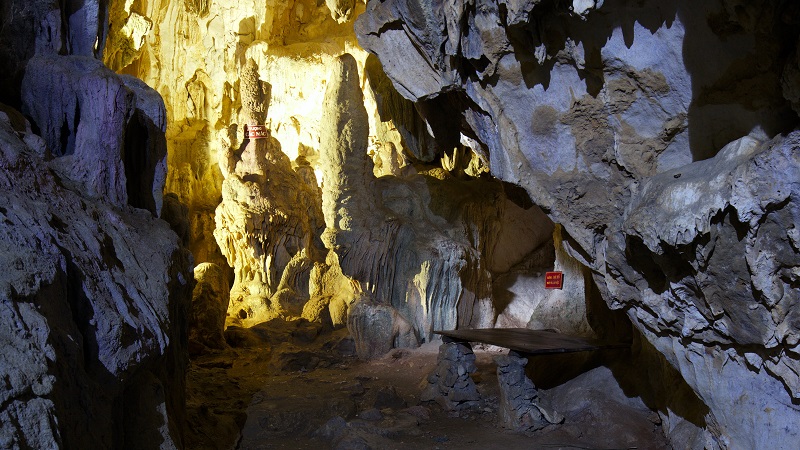
Pac Bo boasts an absolutely wild and primitive nature with limestone mountains, cave, azure rivers and lakes and green paddies. Pac Bo cave is the place Ho Chi Minh lived for seven weeks while Lenin Stream is the place the beloved leader sat and worked during his time here.
9. Ba Be Lake:
From Cao Bang, you can visit another nature masterpiece – Ba Be Lake – the largest freshwater natural lake in Vietnam. Not only the landscape is the specialty in Ba Be, the local culture is a real charm, too. You should homestay at Pac Ngoi village – a very beautiful village by the lake filled with idyllic traditional stilt houses of Tay people.
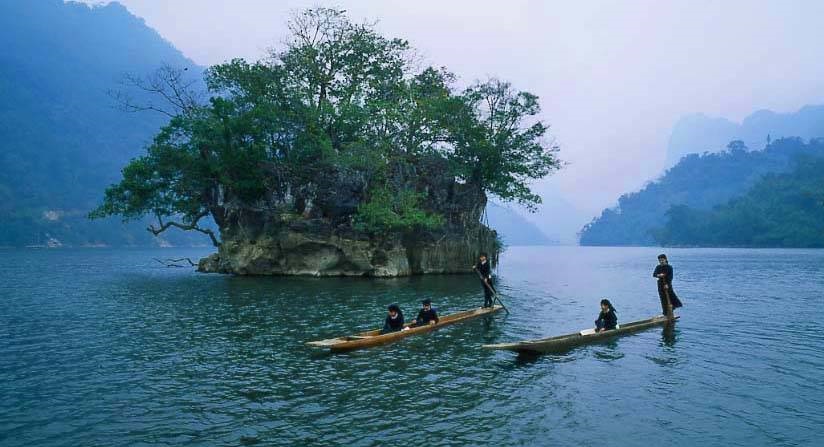
Take a kayaking trip to the three lakes, don’t miss visiting the many special caves such as Puong Cave, Hua Ma Cave and Lo Mo Cave. An Ma temple is also a place to stop and know more about the famous legend related to this lake.
What is Best Local Food to Eat in Ban Gioc Waterfall and Cao Bang?
In Cao Bang you can find plenty eateries but in Ban Gioc Waterfall, food and drinks are not so readily available. You can find your lunch in the markets in Trung Khanh and Quang Uyen, some small stalls making noodles and other dishes. In Cao Bang city, if you want to find some local specialties, here are the dishes you can try:
1. Roasted Duck with Seven Flavors:
This flavorful dish is a must-eat in Cao Bang. The duck roasted with spices, leaves put deep inside can make you impatient while waiting for it to come. After roasted, the duck pieces are mixed with Cao Bang honey. Take a first bite, you can feel the rough and chewy texture on your tongue. The dish is quite expensive yet it's worth every penny.
2. Trung Khanh Chestnuts:
Trung Khanh chestnuts make the name as the best chestnut you can find in Vietnam and considered as a specialty of Cao Bang. Eaters will remember the fleshy flavor of the chestnuts, especially roasted. The chestnut shell is tough and hard to peel off. But once you get to the inner nut, its taste is just so rewarding. Come to Trung Khanh Cao Bang in autumn, you can find the chestnuts everywhere.
3. Cao Bang's Sour Pho (Sour Noodle Soup):
The unique sour noodle is the highlight of Cao Bang culinary. A bowl of Cao Banh Pho is abundant, filled with fleshy liver meat, bacon, roasted duck, heap of peanuts and chili. In summer time, the sauce is made with a light sour taste, making it even delicious. This dish can be eaten for any meal of the day.
4. Ant Eggs Cake:
Tay people go into the forest to collect ant's eggs to make cakes. This specific cake is made of flour, ant’s eggs, and fig leaves. When you have a bite of this cake, you can feel the fat and nutritious taste that is so hard to forget.
5. Canarium Fruit Sticky Rice:
This is another dish with the main feature taken from the jungle of Cao Bang. Tay and Nung people go to collect the precious Canarium Fruits to make sticky rice. The canarium used for sticky rice is black canarium, also for braising fish, make sauce....
How to Get to Cao Bang and Ban Gioc Waterfall?
Cao Bang is about 300 kilometers from Hanoi and from Cao Bang, Trung Khanh is about 70 kilometers. It’s most ideal for a 3-day trip to make most of your experience in Cao Bang. Thanks for the new highway, the route Hanoi – Thai Nguyen – Bac Kan – Cao Bang is the easiest and fastest way for you.
You can take a sleeper bus from My Dinh bus station which will takes 8 hours to get to Cao Bang. From Cao Bang, Ban Gioc is about 90 kilometers to the east. You can rent a motorbike to the waterfall at your guest house or hotel for about 200,000VND per day. The alternative option for you is the local bus which runs from Cao Bang to Ban Gioc and back many times of day.
When is the Best Time to Visit Ban Gioc Waterfall?
Although the fall can be visited in any time of year, the ideal time to visit Ban Gioc Waterfall and Cao Bang is between September and October. In this time, the rain is less frequent and it’s also the time for harvest season when the paddy fields in Phong Nam become golden.
See Also:
Comments
Post a Comment